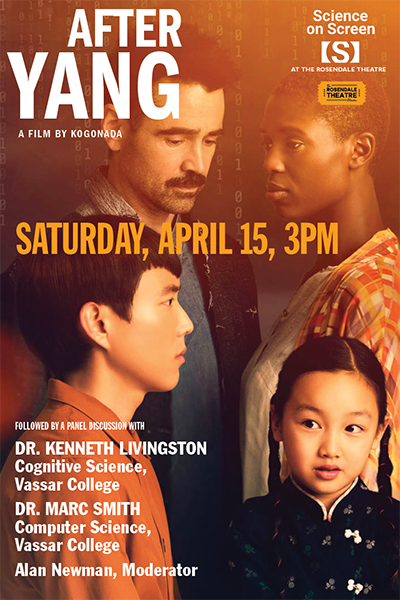
$10 / $6 members | 1hr 36m | PG | Drama Sci Fi | Panel discussion follows the screening
What does it mean to be human in a world with androids?
Join us for Science on Screen® presenting the provocative film After Yang with a post-film discussion with Dr. Kenneth Livingston, Professor of Cognitive Science at Vassar College, and Dr. Marc Smith, chair of the Computer Science department at Vassar College. The Theatre’s Science on Screen® producer Alan Newman will moderate the discussion.
After Yang (2022) is set in the near future and revolves around a family of four that includes a humanlike robot, “son” Yang. When Yang malfunctions, the story focuses on whether to repair the robot or let it “die.” The film stars Collin Farrell (In Bruges, The Banshees of Inisherin) and is one of Barack Obama’s ten best films of 2022.
The film asks what it means to be human in a world filled with technology, wrote film critic David Sims of The Atlantic. “The result is a pensive drama that plays like a quiet mystery, seeking to understand not just its human protagonist but the deeper underpinnings of all social connections.”
Following the film, the audience will also be able to ask questions of Profs. Livingston and Smith on issues raised by the film.
Livingston earned both his undergraduate and graduate degrees at Harvard University. His training and interests have been across various disciplines. As such, he was one of the founding members of the Interdisciplinary Robotics Research Laboratory, a founding member of Vassar’s Department of Cognitive Science, and serves on the Steering Committee of the Science, Technology, and Society Program at Vassar.
Smith received his B.S., M.S., and Ph.D. degrees in computer science from the University of Central Florida. After spending 15 years working for AT&T, he joined the faculty of Colby College. In 2006, he moved to Vassar, where his research interests span elements of theoretical and experimental computer science, models of parallel and distributed computation, programming languages, unifying theories of programming, and bioinformatics.